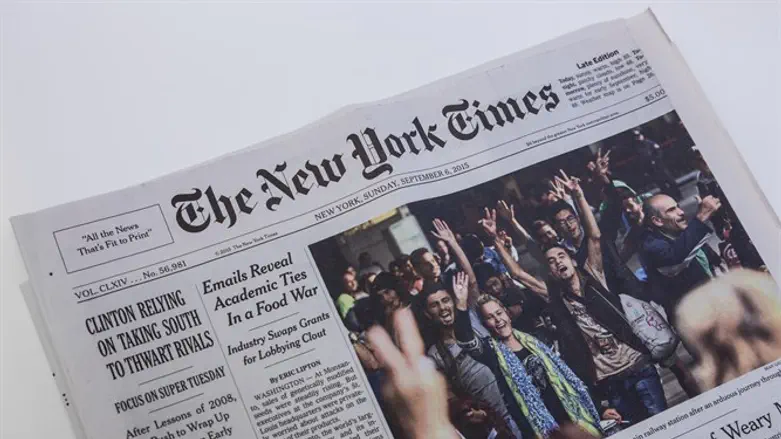
Operating on the assumption that readers to this site are hip to everything that’s going on, I will skip the details about The New York Times cartoon that’s got so many people so upset. If you need the pictures, they are here, here and here – and yes, pretty grim, but then, something else happened.
Columnist Bret Stephens, a staffer at the Times for some two years, took one for the team. His op-ed scorched the paper…his bosses and editors… for publishing such a “despicable cartoon.”
Something like that, from an insider, had to be done, so that the paper can pretend to be truly sorry.
Or sorry that it got caught.
Now, appears to be the thinking, can we please move on and forget the whole thing…please…please…please?
No. This stain is irreversible and can’t be bleached.
For many, the cartoon is a tell…it tells what Times’ writers and editors really think about Israel and the Jewish people; behind closed doors. (Read this for inside the newsroom.)

Of the 500-plus letters-to-the editor responding to Stephens, by my count, 90 percent thought the cartoon was not despicable, not at all, but wholly appropriate. Except that by some miscue, the doors were flung open, and it was like the shock of opening the wrong door to a hotel room.
Except that by some miscue, the doors were flung open, and it was like the shock of opening the wrong door to a hotel room.
That was the feeling you got when you first saw the cartoon. You felt betrayed and embarrassed…embarrassed to be part of a world that is still like this.
Which explains Bret Stephens…embarrassed to be part of a newspaper that is still like this, still like it was when it hid the Holocaust in its back pages.
Stephens (himself no friend of Netanyahu) did not let the paper off the hook…and here is the disturbing part…the readers did.
Of the 500-plus letters-to-the editor responding to Stephens, by my count, 90 percent thought the cartoon was not despicable, not at all, but wholly appropriate. They thought the monstrous depictions of Netanyahu, Trump and the Star of David were… perfectly acceptable, and saw no reason for explanations and apologies.
Rather than applaud Stephens, these multitudes turned on Stephens for daring to depart (this one time) from the Progressive point of view, which is that Israel and Trump are always in the wrong and always to be cursed and damned. Many of these letters read like the op-eds that so frequently run in the paper.
At a glance at these letters, you thought you were reading distilled Tom Friedman or Stephens himself when he was having a bad day….or a typical anti-Israel day.
So many letters, and so much hostility, and so much prejudice, and all of it heaped on the world’s one and only Jewish State. You’d rather not wonder why.
Rather than take a deep breath for self-reflection, rather than understand the cartoon as a sobering experience, instead, these readers poured it on, their scorn for the Jewish State.
So we know how these people were raised. We know how they were conditioned over the years, over the decades and over the century.
The Times itself did not make these people who they are, but to whatever the extent, it did shape their minds and provided a platform for the sort of animosity that was finally encompassed in a single cartoon. It is too late to undo the damage. The Times will have to live with itself now that the truth is out.
The paper has been shown naked…and its readers, they too have been exposed.
New York-based bestselling American novelist Jack Engelhard writes regularly for Arutz Sheva.
He is the author of the international book-to-movie bestseller “Indecent Proposal.” His latest is the newsroom drama “News Anchor Sweetheart.” His Inside Journalism thriller, “The Bathsheba Deadline,” is being prepared for the movies. Contemporaries have hailed him “The last Hemingway, a writer without peer, and the conscience of us all.” Website: www.jackengelhard.com